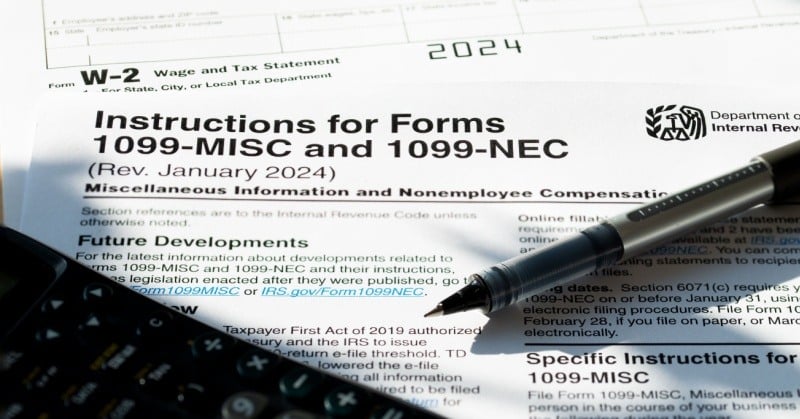BILL Holdings Inc. (NYSE: BILL), a financial operations platform designed for small and midsize businesses (SMBs), recently announced the launch of a new 1099 Filing feature aimed at streamlining the tax filing process for SMBs and their accountants.
This addition enables users to manage 1099-NEC and 1099-MISC forms directly within the BILL platform, potentially simplifying the traditionally time-consuming year-end tax obligations.
BILL’s W-9 collection capabilities are already available to users, providing an immediate solution for gathering essential vendor information. The additional 1099 features, including form generation, delivery and eFiling, are set to launch on January 2, 2025. This phased rollout gives users time to familiarize themselves with the initial functionality before integrating the complete suite into their workflows.
By incorporating these features, BILL continues to expand its suite of financial tools, helping SMBs navigate the complexities of tax compliance more efficiently.
Key features of BILL's 1099 filing offering
The 1099 Filing feature integrates several core functionalities to address key challenges SMBs face during the tax season:
W-9 collection
Users can request and collect W-9 forms directly through the BILL platform. This process eliminates the need to switch between multiple software solutions, centralizing all necessary documentation.
Vendor eligibility marking
The platform allows users to designate vendors as 1099-eligible, enabling precise tracking and reporting of payments that require tax filing. This feature helps businesses maintain compliance with federal regulations.
Expense categorization
Users can review and categorize payments made to vendors in bulk, simplifying the preparation of 1099 forms. This functionality reduces manual data entry and enhances efficiency.
1099 generation and delivery
Once payments are categorized, the platform automatically generates the required 1099 forms. These forms can be delivered to vendors electronically or via USPS, offering flexibility to meet diverse vendor preferences.
eFiling with the IRS
The platform’s eFiling feature allows users to submit 1099 forms directly to the IRS after vendor review, ensuring timely and accurate compliance with federal tax requirements.
Pros of BILL's 1099 filing features
The new feature presents several advantages that align with the needs of SMBs and their accountants:
Integrated workflow
By consolidating essential tax-related tasks such as W-9 collection, payment tracking and 1099 form generation within a single platform, BILL minimizes the complexity of year-end tax preparations. Users can manage the entire process without relying on external tools or systems.
Enhanced accuracy
Direct integration with payment data reduces the reliance on manual entry, thereby lowering the likelihood of errors in tax filings. This accuracy is critical for avoiding costly mistakes or penalties.
Time efficiency
Bulk categorization of expenses and streamlined form generation significantly reduce administrative workloads. SMBs and their accountants can dedicate more time to strategic tasks rather than getting bogged down in manual processes.
Vendor convenience
Providing both electronic and physical delivery options for 1099 forms caters to diverse vendor preferences. This flexibility can improve vendor satisfaction and encourage compliance with reporting requirements.
Regulatory compliance
The eFiling feature ensures timely submission of forms to the IRS, helping businesses stay compliant with federal tax regulations. The platform’s automated processes reduce the risk of missed deadlines or incomplete filings.
Cons of BILL's 1099 filing features
While the feature offers numerous benefits, it is not without its limitations:
State filing limitations
The eFiling capability currently supports state filings only for states participating in the Combined Federal/State Filing (CF/SF) program. Users in states that do not participate in the program must handle state-specific filings separately, adding an additional layer of effort.
Learning curve
Existing users may need time to familiarize themselves with the new functionalities, particularly if they are accustomed to traditional methods. This initial adjustment period could offset some of the efficiency gains.
Dependence on platform
Relying exclusively on a single platform for critical tax filings introduces potential risks. Technical issues or platform downtimes could disrupt the filing process, emphasizing the importance of contingency planning.
Cost considerations
While the feature offers considerable convenience, it may come at an additional cost. Budget-conscious SMBs may need to evaluate whether the benefits outweigh the expense, especially if they already use other tax filing solutions.
Finding the right fit
The introduction of BILL’s 1099 Filing feature represents a step forward in simplifying tax compliance for small and midsize businesses.
By integrating essential tax-related processes into a single platform, BILL aims to reduce the administrative burden on SMBs and their accountants and ensure timely compliance with federal regulations.
While certain limitations, such as state filing restrictions and potential costs, may require consideration, the functionality offered by BILL’s 1099 Filing feature can help provide SMBs with more efficient and accurate tax management.
.png?width=150&height=63&name=TWRlogo-regmark_blueblack%20(1).png)
.png)










Do you have questions about this article? Email us and let us know > info@woodard.com
Comments: